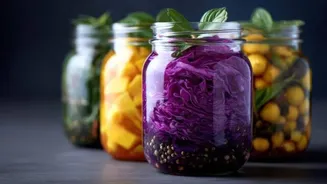Unveiling 5 Key Skills Every Chef Must Master! Dive into the culinary world of India with essential tips for success! Explore more!
Becoming a top-notch chef is not easy, boss! It's more than just knowing
how to cook tasty food. To really shine in the kitchen and make a name for yourself, you need a special set of skills.
Think of it like this: your recipes are the blueprint, but these skills are the tools that help you build something amazing.
From mastering the basics to understanding the science behind the food, here are five essential skills every aspiring chef in India should definitely master to succeed in the competitive culinary world.
These skills will not only help you whip up delicious dishes but also manage your kitchen like a pro. So, tie your apron tight, sharpen your knives, and let's dive into the world of culinary excellence!
Mastering cooking basics: techniques, ingredients, practice, mistakes key to success
First things first, understanding the fundamentals of cooking is absolutely crucial. Like learning the 'ABCD' before writing a novel, you need to nail the basics. This means knowing how to properly chop vegetables – dicing an onion without crying too much is a real achievement, you know!
- mastering different cooking techniques. Sautéing, simmering, braising, boiling, roasting – each method brings out different flavors and textures. Learn to make the perfect rice! Get that dal just right! Indian cuisine is super diverse, so practice with different regional dishes.
Also, understand the importance ingredients, like spices; knowing which spice goes with what is a true art. Practice everyday, cooking every day until you get it. Don't worry if you make mistakes; that's how you learn!
Soon, you will realize that your hands know what to do without you even thinking about it.
Master knife skills for precision and safety in the kitchen
Next up is knife skills. A chef's knife is like a magician's wand – powerful and versatile. But just like a wand, it needs to be handled with care and precision. Learn different knife cuts: the julienne, the brunoise, the chiffonade.
Don't just chop, but aim to create uniform pieces so everything cooks evenly, or else, some pieces will get burnt! Work on your speed and accuracy. This takes practice, so don't be disheartened if you're slow in the beginning. Safety is key too!
Always keep your fingers tucked in and use a sharp knife – a dull knife is more dangerous than a sharp one. A good set of knives and the know-how to use them will make your life in the kitchen so much easier and safer.
Not only will you increase your productivity but it will enhance the final presentation of your dishes. A perfectly diced vegetable makes all the difference.
Patience and time management key to culinary success
Patience and Time management are the secret ingredients to culinary success. Cooking is not a race; it's more like a marathon. Certain dishes need time to develop flavors, so don’t try to rush it. A biryani tastes best when it's cooked slowly over low heat, trust me!.
Learn to multitask without getting stressed. Organize your mise en place like a boss – having all your ingredients prepped and ready to go before you start cooking will save you a lot of time, this is where you get organized and find yourself. Also, keep your workspace clean.
Time management is not about speed; it's about efficiency and planning. A well-planned kitchen is a happy kitchen. Be patient when learning new techniques. Some skills take time to master, so don’t give up easily. Practice, observe, and learn from your mistakes.
With patience and good time management, you'll be able to handle any culinary challenge.
Understanding flavor profiles in Indian cuisine for balanced, bold tastes
Understanding Flavor profiles will really set you apart. It is all about understanding how different foods and ingredients interact with each other to create delicious tastes.
Indian cuisine is known for its bold flavors, therefore, experiment with different spices, herbs, and ingredients, such as tamarind, ginger, and curry leaves. Try different combinations and see what works. It's important to balance the basic taste: sweet, sour, salty, bitter, and umami.
Learn about the regional variations in Indian cuisine. Understand why a South Indian sambhar tastes different from a North Indian dal makhani. This involves knowing which spices are traditionally used in different parts of the country.
Understanding flavor profiles will help you create dishes that are both delicious and balanced. Once you've got a foundation of knowledge, you can use your palate and create your unique spin on food.
Creativity transforms cooks into exceptional chefs
Creativity turns an ordinary cook into an extraordinary chef. Keep experimenting! Don't be afraid to try new things and put your own spin on classic dishes. Mix and match ingredients, play with flavors, and create something unique. Try fusing together different cuisines.
How about a dosa with a Mexican filling? Don't just copy recipes, understand them. Then, adapt them to your own style and preferences. Look for inspiration everywhere. Visit local markets, try dishes at different restaurants, and read cookbooks from diverse cuisines.
But most importantly, taste everything. Never stop tasting and learning. Creativity is not about being random; it's about having a solid understanding of the fundamentals and then using that knowledge to create something new and delicious. It's what will make your food stand out.
Good management crucial for successful kitchen operations
Finally, good management capabilities are just as important as cooking skills. A chef is not only a cook but also in-charge of a team. If you want to be a head chef or run your own restaurant, you need to know how to manage a kitchen efficiently.
This means knowing how to handle your staff, delegate tasks, organize inventory, and control costs. Always communicate effectively, that means being clear, concise, and respectful to your team members. Listen to their feedback and respond to their concerns.
Create a positive and supportive work environment, therefore, a happy team is a productive team. You will want to master inventory management. This includes ordering ingredients, minimizing waste, and ensuring that everything is fresh.
Effective management is key to running a smooth and successful kitchen. It will ensure that your restaurant is not just a place where food is cooked but a place where dreams are realized.
AI Generated Content. Glance/InMobi shall have no liability for the content













